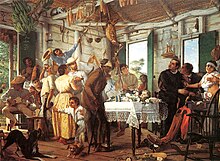Our website is made possible by displaying online advertisements to our visitors.
Please consider supporting us by disabling your ad blocker.
Puerto Ricans
| |
|---|---|
 | |
| Total population | |
| Puerto Ricans: ~9 million Diaspora: ~6 million[1][2] | |
| Regions with significant populations | |
| 3,205,691[3] | |
| 5,840,782[4] | |
(2020) | 7,759[5] |
| 6,083[6] | |
| 3,405[7] | |
| 1,970[8] | |
| 528[9] | |
| 241[10] | |
| Languages | |
| Religion | |
| Related ethnic groups | |
| Part of a series on |
| Puerto Ricans |
|---|
 |
| By region or country |
| Subgroups |
| Culture |
| Religion |
| History |
| Language |
|
|
Puerto Ricans (Spanish: Puertorriqueños),[12][13] most commonly known as Boricuas,[a][14] but also occasionally referred to as Borinqueños, Borincanos,[b] or Puertorros,[c][15] are an ethnic group native to the Caribbean archipelago and island of Puerto Rico, and a nation identified with the Commonwealth of Puerto Rico through ancestry, culture, or history. Puerto Ricans are predominately a tri-racial, Spanish-speaking, Christian society, descending in varying degrees from Indigenous Taíno natives, Southwestern European colonists, and West and Central African slaves, freedmen, and free Blacks. As citizens of a U.S. territory, Puerto Ricans have automatic birthright American citizenship, and are considerably influenced by American culture. The population of Puerto Ricans is between 9 and 10 million worldwide, with the overwhelming majority residing in Puerto Rico and mainland United States.
- ^ "Nevada and Idaho Are the Nation's Fastest-Growing States". United States Census Bureau. December 19, 2018. Archived from the original on December 20, 2018. Retrieved December 30, 2018.
- ^ "Cumulative Population Change: April 1, 2010 to July 1, 2017 for Puerto Rico". United States Census Bureau. July 1, 2017. Retrieved January 13, 2020.
- ^ "Quick Facts Puerto Rico: Population Estimates, July 1, 2023". United States Census Bureau. July 1, 2023. Archived from the original on March 30, 2021. Retrieved March 15, 2024.
- ^ "B03001 HISPANIC OR LATINO ORIGIN BY SPECIFIC ORIGIN - United States - 2022 American Community Survey 1-Year Estimates". U.S. Census Bureau. July 1, 2022. Retrieved September 21, 2023.
- ^ [1]
- ^ El panorama de la migración en República Dominicana: Cuadro 2.4. Los Haitianos son el principal grupo de inmigrantes
- ^ "2016 Census of Canada: Topic-based tabulations". 2.statcan.ca. April 2, 2011. Archived from the original on April 22, 2018. Retrieved May 20, 2016.
- ^ Los extranjeros en México Archived February 14, 2007, at the Wayback Machine
- ^ Estadísticas Venezuela
- ^ "Bevolking; geslacht, leeftijd, generatie en migratieachtergrond". Centraal Bureau voor de Statistiek (in Dutch). January 1, 2019. Archived from the original on May 7, 2022. Retrieved April 19, 2022.
{{cite web}}: CS1 maint: bot: original URL status unknown (link) - ^ "Key findings about Puerto Rico". March 29, 2017.
- ^ "puertorriqueño, ña". Diccionario de la Lengua Española por la Real Academia Española (in Spanish). Retrieved January 19, 2024.
- ^ "puertorriqueño -ña". Diccionario de la Lengua Española por la Real Academia Española (in Spanish). Retrieved January 19, 2024.
- ^ "puertorriqueño". Diccionario de la Lengua Española por la Real Academia Española (in Spanish). Retrieved January 19, 2024.
- ^ "puertorro, -a". Asociación de Academias de la Lengua Española: Diccionario de Americanismos (in Spanish). Retrieved January 19, 2024.
Cite error: There are <ref group=lower-alpha> tags or {{efn}} templates on this page, but the references will not show without a {{reflist|group=lower-alpha}} template or {{notelist}} template (see the help page).
Previous Page Next Page


